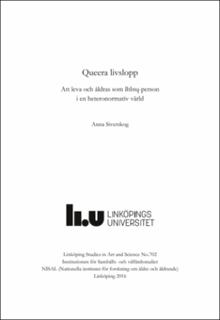Queera livslopp: Att leva och åldras som lhbtq-person i en heteronormativ värld
Original version
Siverskog, A. (2016). Queera livslopp : Att leva och åldras som lhbtq-person i en heteronormativ värld (PhD dissertation, Linköping University Electronic Press). https://doi.org/10.3384/diss.diva-132553Abstract
This study is based on life-course interviews with 20 LGBTQ-identified people, born between 1922 and 1950, 62-88 years old at the time of the interviews. Older LGBTQ-identified people have experienced tremendous changes in how gender identities and sexualities have been re-negotiated during their lifetimes. Even though there is a small but growing field of LGBTQ ageing studies, queer studies rarely problematizes age or ageing. At the same time, the gerontological field often assumes heterosexuality and cis-gender experiences. This dissertation uses a life course perspective and focuses on queer lines, life courses that move beyond the heteronormative expectations of how one should live one’s life in relation to gender identity and/or sexuality. The overarching aim of the study is to explore experiences and meanings of living and ageing as LGBTQ in a changing heteronormative world. Thematic analysis is used to analyse and interpret the empirical material. The theoretical framework in this study refers to critical gerontology, feminist theory and queer theory. The analysis points to how experiences of gender identity and sexuality relate to historical and geographical contexts, and change over time. It illustrates how gender, age and sexuality intersect with heteronormative expectations of what a life is supposed to be like. To not live up to these expectations by not adjusting to binary gender norms or not getting married and having children may have large social as well as material consequences. These include having to hide one’s gender identity or sexuality, being socially repudiated and discriminated against or being subject to physical violence. Despite these conditions, the interviewees have oriented toward other lines - other ways of living where there is room for their gender identities and sexualities. The interviews point to the significance of social relations, networks and LGBTQ communities. LGBTQ groups and meeting places that have been created over time have facilitated in finding these other lines. Most of the narratives on ageing are similar to those of other people the same age, but there are also narratives that are specific to LGBTQ experiences. For some the ageing body has ruled out the possibility of undergoing transgender-specific surgeries. Others are worried about encountering homophobic or transphobic treatment when in need of care. The results point to the importance of including critical approaches of gender and sexuality within gerontology and life course studies, and to including materiality when theorizing the ageing body. The dissertation also constitutes a theoretical bridge between gerontology, feminist theory and queer theory and contributes to more complex understandings of intersections between age, gender and sexuality to these fields.
